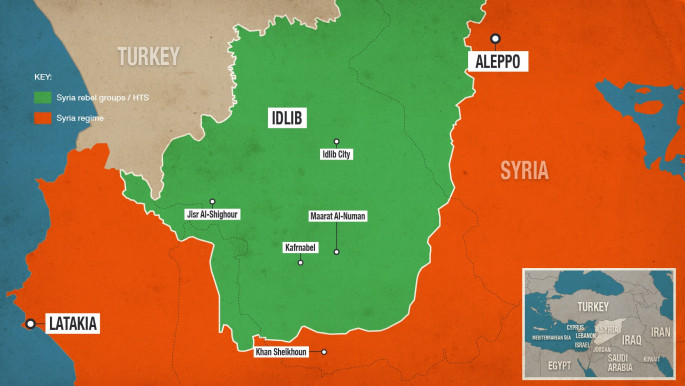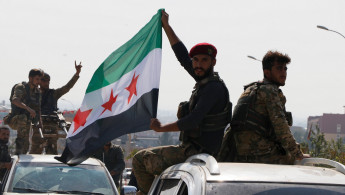Hundreds of Turkish-backed Syrian fighters arrive in Idlib to halt regime advance
Hundreds of Turkish-aligned rebel fighters have arrived in southern Idlib province to fight against Bashar Al-Assad's regime.
The Syrian National Army (SNA) is widely regarded to be a Turkish proxy force and took part in "Operation Peace Spring", which targeted Kurdish forces in northeastern Syria in October 2019 as well as "Operation Olive Branch", which captured the Afrin area from the same group.
Idlib province has been under a ferocious assault from the Assad regime and Russia, with hundreds of thousands of people fleeing the south of the province.
A spokesman for the SNA, Yousef Hammoud, told the Syrian news website Enab Baladi that two brigades from the group had entered Idlib province following an agreement with the hardline Islamist group Hayat Tahrir al-Sham (HTS), which dominates the rebel-held province.
Hammoud added that 1,000 SNA fighters would eventually arrive in Idlib province in coordination with the National Liberation Front rebel group, which has a presence on the ground there according to Enab Baladi.
Read also: How Russia uses de-escalation agreements to destroy cities in Syria
He said that the agreement with HTS was the result of "popular pressure and negotiations by the National Liberation Front".
Adnan al-Ahmed, the deputy defence minister in the opposition's "Syrian Interim Government", said that HTS had previously refused to allow any SNA fighters to enter Idlib.
However, HTS' military spokesman, Abu Khaled Al-Shami denied this and said that they had allowed the fighters entry on condition that they head towards rebels' frontlines with the regime.
HTS was formed in 2017 by Islamist rebel groups including the Al-Nusra Front, which was previously Al-Qaeda's affiliate in Syria.
The Syrian conflict broke out in 2011 following the Assad regime's brutal suppression of peaceful pro-democracy protests. More than 500,000 people have been killed and millions more displaced, mostly as a result of Assad regime bombardment of civilian areas.
Islamist groups became prominent as the conflict progressed and many countries, including Turkey, Russia, Iran, and the United States have become involved in the conflict and backed rival militias.





 Follow the Middle East's top stories in English at The New Arab on Google News
Follow the Middle East's top stories in English at The New Arab on Google News
![The UAE is widely suspected of arming the RSF militia [Getty]](/sites/default/files/styles/image_330x185/public/2024-11/GettyImages-472529908.jpg?h=69f2b9d0&itok=Yauw3YTG)
![Netanyahu furiously denounced the ICC [Getty]](/sites/default/files/styles/image_330x185/public/2024-11/GettyImages-2169352575.jpg?h=199d8c1f&itok=-vRiruf5)
![Both Hamas and the Palestinian Authority welcomed the ICC arrest warrants [Getty]](/sites/default/files/styles/image_330x185/public/2024-11/GettyImages-2178351173.jpg?h=199d8c1f&itok=TV858iVg)